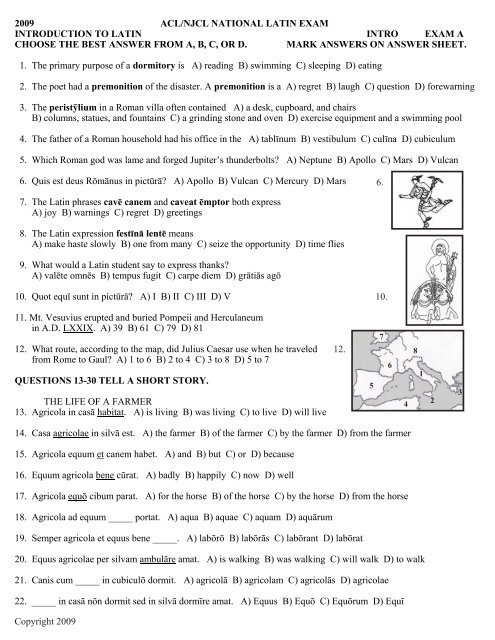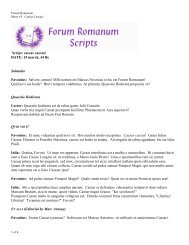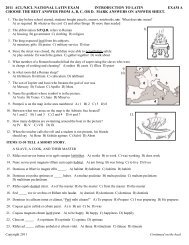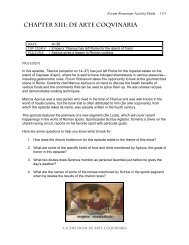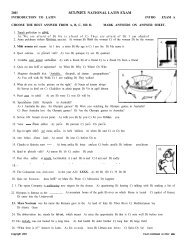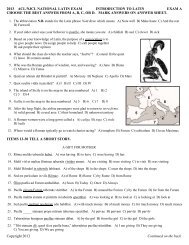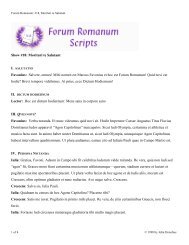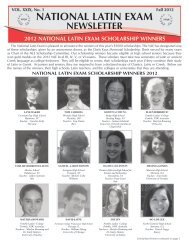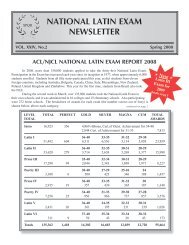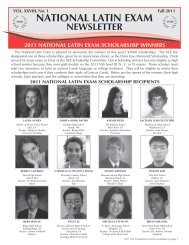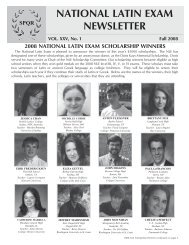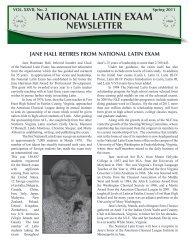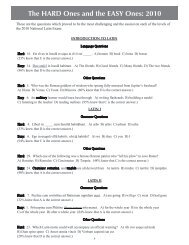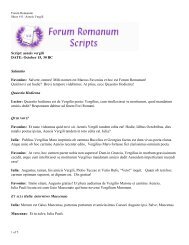2009 acl/njcl national latin exam introduction to latin intro exam a ...
2009 acl/njcl national latin exam introduction to latin intro exam a ...
2009 acl/njcl national latin exam introduction to latin intro exam a ...
You also want an ePaper? Increase the reach of your titles
YUMPU automatically turns print PDFs into web optimized ePapers that Google loves.
<strong>2009</strong> ACL/NJCL NATIONAL LATIN EXAM<br />
INTRODUCTION TO LATIN INTRO EXAM A<br />
CHOOSE THE BEST ANSWER FROM A, B, C, OR D. MARK ANSWERS ON ANSWER SHEET.<br />
1. The primary purpose of a dormi<strong>to</strong>ry is A) reading B) swimming C) sleeping D) eating<br />
2. The poet had a premonition of the disaster. A premonition is a A) regret B) laugh C) question D) forewarning<br />
3. The peristylium in a Roman villa often contained A) a desk, cupboard, and chairs<br />
B) columns, statues, and fountains C) a grinding s<strong>to</strong>ne and oven D) exercise equipment and a swimming pool<br />
4. The father of a Roman household had his office in the A) tablīnum B) vestibulum C) culīna D) cubiculum<br />
5. Which Roman god was lame and forged Jupiter’s thunderbolts? A) Neptune B) Apollo C) Mars D) Vulcan<br />
6. Quis est deus Rōmānus in pictūrā? A) Apollo B) Vulcan C) Mercury D) Mars<br />
7. The Latin phrases cavē canem and caveat ēmp<strong>to</strong>r both express<br />
A) joy B) warnings C) regret D) greetings<br />
8. The Latin expression festīnā lentē means<br />
A) make haste slowly B) one from many C) seize the opportunity D) time flies<br />
9. What would a Latin student say <strong>to</strong> express thanks?<br />
A) valēte omnēs B) tempus fugit C) carpe diem D) grātiās agō<br />
10. Quot equī sunt in pictūrā? A) I B) II C) III D) V<br />
11. Mt. Vesuvius erupted and buried Pompeii and Herculaneum<br />
in A.D. LXXIX. A) 39 B) 61 C) 79 D) 81<br />
12. What route, according <strong>to</strong> the map, did Julius Caesar use when he traveled<br />
from Rome <strong>to</strong> Gaul? A) 1 <strong>to</strong> 6 B) 2 <strong>to</strong> 4 C) 3 <strong>to</strong> 8 D) 5 <strong>to</strong> 7<br />
QUESTIONS 13-30 TELL A SHORT STORY.<br />
THE LIFE OF A FARMER<br />
13. Agricola in casā habitat. A) is living B) was living C) <strong>to</strong> live D) will live<br />
14. Casa agricolae in silvā est. A) the farmer B) of the farmer C) by the farmer D) from the farmer<br />
15. Agricola equum et canem habet. A) and B) but C) or D) because<br />
16. Equum agricola bene cūrat. A) badly B) happily C) now D) well<br />
17. Agricola equō cibum parat. A) for the horse B) of the horse C) by the horse D) from the horse<br />
18. Agricola ad equum _____ portat. A) aqua B) aquae C) aquam D) aquārum<br />
19. Semper agricola et equus bene _____. A) labōrō B) labōrās C) labōrant D) labōrat<br />
20. Equus agricolae per silvam ambulāre amat. A) is walking B) was walking C) will walk D) <strong>to</strong> walk<br />
21. Canis cum _____ in cubiculō dormit. A) agricolā B) agricolam C) agricolās D) agricolae<br />
22. _____ in casā nōn dormit sed in silvā dormīre amat. A) Equus B) Equō C) Equōrum D) Equī<br />
Copyright <strong>2009</strong><br />
Copyright <strong>2009</strong><br />
12.<br />
5<br />
6.<br />
10.<br />
7<br />
6<br />
4<br />
8<br />
1<br />
2<br />
3
23. Agricola canem vocat quod tempus fugit. A) although B) because C) and D) where<br />
24. “Ego tē exspectābam,” agricola dīcit. A) am waiting for B) wait for C) was waiting for D) will wait for<br />
25. “Ubi erās tū?” agricola rogat. A) Why B) What C) Where D) How long<br />
26. “Cūr tū in vīllā nōn manēs?” agricola rogat. A) we B) you C) I D) they<br />
27. “Nunc, sedē!” agricola dīcit. A) I am sitting B) sit C) we will sit D) we were sitting<br />
28. “Sed tū _____ bonus canis!” agricola canem laudat. A) sum B) es C) est D) sunt<br />
29. “Ego _____ cēnam tibi parābō.” A) optimās B) optimōs C) optimam D) optimum<br />
30. “Tum nōs stellās spectābimus.” A) we watch B) we are watching C) we were watching D) we will watch<br />
READ THE REST OF THE STORY AND ANSWER THE QUESTIONS.<br />
THE LADY AND THE HORSE<br />
Cotīdiē fēmina in viā per silvam ambulat. Per agrōs 1 Cotīdiē = Every day<br />
ad agricolae vīllam ambulat. Fēmina agricolae duōs nummōs 2 nummōs = coins<br />
dat et agricola fēminae decem māla dat. Ubi fēmina ad vīllam 3 māla = apples<br />
suam revenit, cantat. Cotīdiē equus fēminam audit et 4 suam = her; revenit = returns<br />
ad fēminam ambulat. Fēmina semper equō ūnum mālum dat. 5 mālum = apple<br />
Quondam lātrō fēminam et decem māla videt. Lātrō 6 Quondam = One day; lātrō = robber<br />
fēminam pulsat et in silvam trahit. Fēmina est exanimāta 7 trahit = drags; exanimāta = unconscious<br />
et lātrō decem māla capit. Tum fēmina sē recuperat. 8 capit = takes; sē recuperat = regains consciousness<br />
Est sōla. Clāmat sed nēmō respondet. Silva est obscūra. 9 sōla = alone; nēmō = no one; obscūra = dark<br />
Quod fēmina temptat esse placida, cantat. Equus 10 placida = calm<br />
fēminam audit et ad fēminam festīnat. Equus fēminam 11<br />
ē silvā portat. Nunc fēmina duo māla equō cotīdiē dat. 12<br />
31. In lines 2-3, we learn that the woman gets ten apples from A) two boys B) two apple trees C) a merchant<br />
D) a farmer<br />
32. Lines 3-4 indicate that on the way home the woman A) meets friends B) sings C) runs D) sells apples<br />
33. Line 5 shows the woman A) likes the horse B) fears the horse C) buys the horse D) avoids the horse<br />
34. In lines 4-5, the horse comes <strong>to</strong> the woman every day because she A) rides him B) feeds him C) waters him<br />
D) brushes him<br />
35. In lines 6-8, the robber gets the apples by A) stealing them when the woman is running<br />
B) tricking the woman C) attacking the woman D) praising the woman<br />
36. Where does the woman awake (lines 6-9)? A) in the road B) in a wagon C) by a stream D) in the forest<br />
37. In line 10, the woman tries <strong>to</strong> calm herself by A) counting sticks B) drinking some water<br />
C) making a campfire D) singing a song<br />
38. In lines 9-11, the only one <strong>to</strong> hear the woman is A) the horse B) the robber C) another woman D) the farmer<br />
39. In lines 10-11, the horse hurries <strong>to</strong> the woman because A) he is thirsty B) the farmer sends him<br />
C) the robber frightens him away D) he recognizes her voice<br />
40. Now the woman gives the horse two apples every day because the horse A) has been sick B) kicked the robber<br />
C) rescued her D) summoned the villagers<br />
Copyright <strong>2009</strong><br />
Copyright <strong>2009</strong>
<strong>2009</strong> ACL/NJCL NATIONAL LATIN EXAM LATIN I I EXAM B<br />
CHOOSE THE BEST ANSWER FROM A, B, C, OR D. MARK ANSWERS ON ANSWER SHEET.<br />
1. Vōs omnēs fābulam dē Cerberō scītis. A) All of them B) You all C) All your D) We all<br />
2. Estne Graecia patria tua? A) Your country isn't Greece, is it? B) Why isn't Greece your country? C) Is Greece<br />
your country? D) Will Greece be your country?<br />
3. Multī equī per agrōs currēbant. A) have run B) will run C) are running D) were running<br />
4. Boys, don't walk <strong>to</strong> the beach without your father! A) nōlī ambulāre B) nōn ambulātis<br />
C) nōlīte ambulāre D) nōn ambulāre<br />
5. Prīma prōvincia Rōmāna erat____. A) Siciliam B) Sicilia C) Siciliae D) Siciliā<br />
6. Erāmus semper amīcī bonī. A) We were B) We have been C) We will be D) We are<br />
7. In itinere viās et tabernās Rōmānās vidēre potuimus. A) <strong>to</strong> see B) saw C) will see D) were seeing<br />
8. Et māter et pater canēs amant. A) neither…nor B) both…and C) not only…but also D) either…or<br />
9. Senā<strong>to</strong>r fīliō pulchrum dōnum dēmōnstrāvit. A) from his son B) with his son C) by his son D) <strong>to</strong> his son<br />
10. Agricola decem servōs habuit, sed duo effūgērunt. Nunc habet ____servōs. A) trēs B) sex<br />
C) octō D) novem<br />
11. Virī ex urbe ad ____ currēbant. A) mōns B) montī C) monte D) montem<br />
12. Curre, ____, ad silvam cum puerīs! A) Marcus B) Marce C) Marcum D) Marcō<br />
13. What is the Latin word for the Roman numeral VI? A) trēs B) quattuor C) quīnque D) sex<br />
14. Crās vōs ____ in vīllā tuā. A) estis B) erātis C) eritis D) fuistis<br />
15. Noster frāter lentē ad urbem appropinquābat. A) slow B) slowly C) slower D) slowest<br />
16. Omnēs cīvēs in urbe sine ____ labōrābant. A) aquā B) aquae C) aquam D) aquās<br />
17. Cūr parvus puer arborem magnam ascendit? A) When B) How C) Where D) Why<br />
18. When the teacher calls her name from the roll, Mary answers A) Nēmō B) Adsum C) Valē D) Grātiās<br />
19. Illegible, lecture, and legend all come from the Latin verb meaning <strong>to</strong> A) speak B) write C) deny D) read<br />
20. Smith, Jones, et al. have written a handy reference book. A) note well B) for <strong>exam</strong>ple C) and others D) that is<br />
21. In Rome the Pa<strong>latin</strong>e, Aventine and Capi<strong>to</strong>line were all A) temples B) hills C) theaters D) shops<br />
22. Apodytērium, tepidārium, strigilēs and thermae are terms associated with Roman A) bathing B) eating<br />
C) mourning D) shopping<br />
23. The Greeks said that Demeter was the goddess of grain; the Romans called her A) Juno B) Ceres<br />
C) Diana D) Venus<br />
24. Although Ann was not present at the meeting, she was elected president A) carpe diem B) sine die<br />
C) in absentia D) per capita<br />
25. When the mythical musician Orpheus lost his young bride Eurydice <strong>to</strong> a snake bite, where did he go <strong>to</strong> retrieve<br />
her? A) the Underworld B) Crete C) Mt. Olympus D) Circe’s palace<br />
26. Alpēs et Apennīnī et Olympus sunt A) maria B) urbēs C) flūmina D) montēs<br />
Copyright <strong>2009</strong><br />
Copyright <strong>2009</strong>
27. Which of the following was said <strong>to</strong> be a slave who became one of the legendary kings of Rome?<br />
A) Servius Tullius B) Cincinnatus C) Marc An<strong>to</strong>ny D) Augustus<br />
28. Who prevented Lars Porsena and the Etruscans from crossing the bridge over the Tiber River in Rome’s early<br />
days? A) Romulus B) Appius Claudius C) Horatius D) Julius Caesar<br />
29. Locate Germānia on the map. A) 2 B) 4 C) 5 D) 6<br />
30. Locate Sicilia on the map. A) 1 B) 3 C) 7 D) 8<br />
READ THE PASSAGE AND ANSWER THE QUESTIONS.<br />
THE STRANGE RELATIONSHIP OF PICUS AND CIRCE<br />
A king and a witch do not see eye <strong>to</strong> eye.<br />
Ōlim erat rēx nōmine Pīcus. Prope rēgiam Pīcī habitābat maga clāra, Circē.<br />
Circē magnam et malam potentiam habēbat; saepe virōs aut in bēstiās aut in avēs<br />
mūtābat. Circē Pīcum vīdit et statim amāvit. Rēx autem magam nōn amābat<br />
quod uxōrem pulchram iam habēbat. Circē īrāta erat et Pīcum pūnīre cupiēbat.<br />
“Crās corōnam rēgis Pīcus nōn geret,” inquit, “sed cristam avis!”<br />
Postrīdiē rēx populum ad magnam cēnam invītāvit. Ante cēnam Pīcus<br />
cum paucīs amīcīs in silvam propinquam ambulāvit. Circē quoque in silvam<br />
sēcrētō ambulāvit et in altā arbore sēdit. Mox amīcī rēgis spectāculum mīrum<br />
vīdērunt, nam Circē formam Pīcī mūtāvit. Rēx nōn iam corōnam gerēbat; cristam<br />
habēbat. Iam manūs Pīcī erant ālae; Pīcus habēbat pedēs avis. Nāsum nōn habēbat<br />
sed rostrum. Pennās multōrum colōrum gerēbat. Vōx nōn iam erat virī sed avis.<br />
\ Et ubi tempus erat cēnae, Pīcus in trīclīnium nōn ambulāvit sed volāvit. Posteā<br />
in silvīs et hortīs habitāvit; numquam iterum formam hūmānam habuit.<br />
31. Picus and Circe (line 1) were A) friends B) sister and brother C) married D) neighbors<br />
32. Circe’s power (line 2) is described as A) healing B) minimal C) evil D) beneficial<br />
33. In line 3, Picus became A) an evil king B) the object of Circe’s affection C) very ill D) the husband of Circe<br />
34. In lines 3-4 (Rēx…habēbat), we learn that A) Circe was beautiful B) Picus was already married<br />
C) Circe became Picus’ wife D) the witch did not love the king<br />
35. The best translation for geret (line 5) is A) was wearing B) has worn C) wore D) will wear<br />
36. Line 6 reveals that A) Picus was treating his people <strong>to</strong> a dinner B) Picus’ subjects were suffering from famine<br />
C) the next day the king had no dinner D) the people offered a dinner for the king<br />
37. When Picus entered the forest (lines 6-7), he A) was alone B) sat in a tree C) had some friends with him<br />
D) had already dined<br />
38. In line 8, spectāculum mīrum refers <strong>to</strong> A) the transformation of Picus B) the appearance of Circe<br />
C) the dinner D) Circe’s speech<br />
39. In lines 9-11 (Rēx…avis), A) the new Picus is described B) birds invade the palace C) Circe dies<br />
D) men engage in a fierce fight<br />
40. From Posteā…habuit (lines 12-13) we learn that the king A) enjoyed having his human features again<br />
B) searched for Circe in his garden C) never saw Circe again D) no longer lived in his palace<br />
Copyright <strong>2009</strong><br />
Copyright <strong>2009</strong><br />
29.<br />
30.<br />
6<br />
4<br />
7<br />
1 rēgiam = palace; maga = witch<br />
2 potentiam = power; avēs = birds<br />
3 mūtābat = used <strong>to</strong> change<br />
4 pūnīre = <strong>to</strong> punish<br />
5 corōnam = crown; cristam = crest<br />
6 Postrīdiē = on the following day<br />
7 paucīs = a few; propinquam = nearby<br />
8 mīrum = strange<br />
9<br />
10 ālae = wings<br />
11 rostrum = beak; Pennās = feathers<br />
12 volāvit = flew<br />
13 numquam = never<br />
2<br />
3<br />
8<br />
1<br />
5
<strong>2009</strong> ACL/NJCL NATIONAL LATIN EXAM LATIN II II EXAM C<br />
CHOOSE THE BEST ANSWER FROM A, B, C, or D. MARK ANSWERS ON ANSWER SHEET.<br />
1. Sociī reliquōs diēs in Italiā placidē habitābant. A) of the remaining days B) with the days remaining<br />
C) after the remaining days D) for the remaining days<br />
2. Pōns Sublicius ab Horātiō dēfēnsus erat. A) by Horatius B) <strong>to</strong> Horatius C) from Horatius D) with Horatius<br />
3. Rōmānī Tarquinium Superbum, septimum _____, expulērunt. A) rēx B) rēgis C) rēgem D) rēgum<br />
4. Quae puella celerius quam Atalanta currere poterat? A) quickly B) more quickly C) quick D) very quick<br />
5. Octō et septem sunt A) septendecim B) quīndecim C) sēdecim D) duodēvīgintī<br />
6. “Oppugnābisne haec castra?” lēgātus imperātōrem rogāvit. A) Will this camp be attacked?<br />
B) Will you attack this camp? C) Surely you are attacking this camp? D) Was this camp attacked?<br />
7. Mīles pugnāns gladium āmīsit. A) while fighting B) after fighting C) by fighting D) about <strong>to</strong> fight<br />
8. Paedagōgus cum puerīs ad lūdum ambulāverit. A) will have walked B) had walked C) has walked<br />
D) will walk<br />
9. Līberīs īre ad mare licēbat. A) it was necessary B) it was right C) it seemed D) it was allowed<br />
10. Aenēās nōn putat nympham pulchram esse suam mātrem. A) will be B) is C) was D) had been<br />
11. Quamquam longē abest, ad circum ambulābimus. A) Wherever B) Although C) Since D) When<br />
12. Augustus erat melior imperā<strong>to</strong>r quam Tiberius. A) who was Tiberius B) because of Tiberius C) than Tiberius<br />
D) after Tiberius<br />
13. Cuius puerī equus aquam bibēbat? A) For which boy B) By which boy C) Which boy’s D) The boy whose<br />
14. Servī per Forum dūcī nōn amābant. A) <strong>to</strong> have led B) <strong>to</strong> be led C) <strong>to</strong> have been led D) <strong>to</strong> lead<br />
15. Spartacus scīvit sē nōluisse esse servum. A) his B) him C) they D) he<br />
16. Caesar _____ magnam in proximō colle vīdit. A) aciem B) aciēī C) aciērum D) aciēbus<br />
17. Alesia, urbs capta ā Caesare, est in Galliā. A) having captured B) about <strong>to</strong> capture C) capturing<br />
D) captured<br />
18. The common element of the words suppress, suffer, success, and surreptitious is their Latin prefix which<br />
means A) apart B) without C) under D) behind<br />
19. Pluit, ningit, and sōl lūcet all deal with A) sports B) weather C) entertainment D) fashion<br />
20. Whose quest for the golden apples <strong>to</strong>ok him <strong>to</strong> the North African home of Atlas? A) Hercules’ B) Theseus’<br />
C) Jason’s D) Bellerophon’s<br />
21. When a citizen of Pompeii went from the apodytērium <strong>to</strong> the tepidārium he was at the A) circus B) basilica<br />
C) arēna D) thermae<br />
22. Rome’s first province was Sicily, won in the First Punic War against A) Egypt B) Britain C) Gaul<br />
D) Carthage<br />
23. The forensic investiga<strong>to</strong>r pho<strong>to</strong>graphed the evidence in situ. A) in its original position B) after death<br />
C) without delay D) with skill<br />
24. Chronologically, which event occurred first? A) eruption of Vesuvius and destruction of Pompeii B) Caesar’s<br />
conquest of Gaul C) Octavian <strong>to</strong>ok the name Augustus D) Hannibal crossed the Alps in<strong>to</strong> Italy<br />
25. A Roman could learn about Lucretia, Livia, and Cornelia by reading A) Aesop’s Fables<br />
B) Homer’s Odyssey C) Livy’s From the Founding of the City D) Ovid’s Metamorphoses<br />
Copyright <strong>2009</strong><br />
Copyright <strong>2009</strong>
26. Which body of water lies between Italy and Greece? A) Baltic Sea B) Adriatic Sea C) Atlantic Ocean<br />
D) Black Sea<br />
27. What might a judge say <strong>to</strong> a defendant who says, “But, sir, I didn’t know!” A) Habeas corpus<br />
B) Nolo contendere C) Sine die D) Ignorantia legis neminem excusat<br />
READ THE PASSAGE AND ANSWER THE QUESTIONS.<br />
APOLLO’S REVENGE<br />
Ōlim erat lēgātus Rōmānus nōmine Gāius Verrēs quī erat improbus 1 improbus = wicked<br />
āmēnsque. Hic vir, ab Italiā iter faciēns, ad īnsulam Dēlum vēnit. In 2 āmēns = crazy<br />
hāc īnsulā fuit templum clārissimum Apollinis. Verrēs templum vīsitāvit atque 3<br />
multa et pulchra vīdit, quae dēsīderāvit. Hic igitur statuās pulcherrimās 4<br />
ex hōc templō ūnā nocte remōvit et eās in nāvem posuit. 5<br />
Postrīdiē, fūrtō cognitō, incolae huius īnsulae erant īrātī, sed etiam 6<br />
eī maximē timēbant vītam in īnsulā sine statuīs. “Apollō erit īrātus,” dīxērunt. 7<br />
“Quōmodo nostrās vītās agēmus?” 8<br />
Nāvis autem quae statuās ferēbat vix discesserat cum magna tempestās 9 vix = scarcely<br />
orta est. Nāvis ipsa dēlēta est, sed Verrēs superfuit. Statuae quae in lī<strong>to</strong>re 10 orta est = arose superfuit =<br />
inventae erant in templum ab incolīs repōnēbantur. Mox hic vir improbus ad 11 survived<br />
urbem Rōmam redīvit. Posteā Gāius Verrēs prōcōnsul Siciliae factus est. 12 prōcōnsul = governor<br />
Ibi artēs īnsulae iterum cēpit. 13<br />
Based on Cicero In Verrem II.1<br />
28. What was Verres doing (lines 1-2)? A) painting B) farming C) writing D) travelling<br />
29. The best translation of clārissimum (line 3) is A) famous B) very famous C) more famous D) rather famous<br />
30. Quae (line 4) refers <strong>to</strong> A) the temple B) the island C) beautiful things D) Verres<br />
31. In line 4, hic refers <strong>to</strong> A) Delos B) the statues C) Verres D) Apollo<br />
32. What did Verres do <strong>to</strong> the statues (lines 4-5)? A) buried them B) broke them C) s<strong>to</strong>le them D) painted them<br />
33. The best translation of eās (line 5) is A) it B) them C) some D) his<br />
34. The best translation of fūrtō cognitō (line 6) is A) in order <strong>to</strong> discover the theft B) while discovering the theft<br />
C) after the theft had been discovered D) that they had discovered the theft<br />
35. In line 6, īrātī describes A) Verres B) the statues C) the inhabitants D) Apollo<br />
36. What is the best translation of agēmus (line 8)? A) can we live B) did we live C) had we lived D) will we live<br />
37. In line 9, vix discesserat indicates the A) reluctance of the sailors <strong>to</strong> depart B) lateness of the hour<br />
C) difficulty in moving the statues D) speed with which the s<strong>to</strong>rm arose<br />
38. The best translation of quae in lī<strong>to</strong>re inventae erant (line 10-11) is A) which had been found on the shore<br />
B) which were floating <strong>to</strong> the shore C) which had been carried on<strong>to</strong> the shore D) which they found buried<br />
on the shore<br />
39. In lines 10-11, what happened <strong>to</strong> the statues? A) They were lost at sea B) The inhabitants put them back<br />
C) Verres successfully s<strong>to</strong>le them D) The inhabitants buried them.<br />
40. At the end of the s<strong>to</strong>ry we learn that A) all the statues were broken B) Verres lived <strong>to</strong> steal again<br />
C) Verres was killed D) the inhabitants rebuilt the temple <strong>to</strong> Apollo<br />
Copyright <strong>2009</strong><br />
Copyright <strong>2009</strong>
<strong>2009</strong> ACL/NJCL NATIONAL LATIN EXAM LATIN III III EXAM D<br />
CHOOSE THE BEST ANSWER FROM A, B, C, OR D. MARK ANSWERS ON ANSWER SHEET.<br />
1. Misera Prōserpina ā Plūtōne capta est. A) is being captured B) had been captured C) will be captured<br />
D) was captured<br />
2. Efferte, servī, nōbīs vīnum optimum! A) Bring out B) To have brought out C) About <strong>to</strong> bring out<br />
D) You had brought out<br />
3. Antōnia novam s<strong>to</strong>lam sorōrī ēmptūra est. A) is buying B) is going <strong>to</strong> buy C) is bought D) had bought<br />
4. Nautae ē nāve statim sē prōiēcērunt. A) themselves B) himself C) itself D) ourselves<br />
5. Necesse est tibi scīre quārundam mulierum nōmina. A) with certain women B) by certain women<br />
C) for certain women D) of certain women<br />
6. Vīdī <strong>to</strong>t hominēs ut eōs nūmerāre nōn possem. A) I might not be able B) I was not able C) I will not be able<br />
D) I had not been able<br />
7. Etiam arborēs minimae prōdūcere maximōs frūctūs potuērunt. A) the smallest trees B) the smaller trees<br />
C) the rather small trees D) the small trees<br />
8. Cum mortuus erō, fīlius meus ____ erit. A) rēx B) rēgī C) rēgem D) rēge<br />
9. Gāius Plīnius ad vīllam suam ībat ut epistulās scrīberet. A) by writing letters B) as he wrote letters<br />
C) because he wrote letters D) in order <strong>to</strong> write letters<br />
10. Verba tua mē timōre līberāvērunt. A) of fear B) <strong>to</strong> fear C) for fear D) from fear<br />
11. Antequam adveniēs, servī domum pūrgāverint. A) they will have cleaned B) they would clean<br />
C) they were cleaning D) they had cleaned<br />
12. Praemia victōriae Caesarī sōlī dabuntur. A) of only Caesar B) <strong>to</strong> Caesar alone C) with Caesar alone<br />
D) from only Caesar<br />
13. Duce vulnerātō, mīlitēs ē proeliō effugiēbant. A) After wounding the leader B) As the leader is wounded<br />
C) By wounding the leader D) After the leader had been wounded<br />
14. Sī viam per silvam inveniās, maximās grātiās nostrās habeās. A) you were having B) you had<br />
C) you would have D) you have<br />
15. Mercā<strong>to</strong>r cōnstituit Byzantī nōn manēre. A) for Byzantium B) from Byzantium C) by Byzantium<br />
D) in Byzantium<br />
16. Nōs intrā mūrōs urbis habitābimus. A) above the walls B) outside of the walls C) within the walls<br />
D) beneath the walls<br />
17. Cūr mē secūtus es? A) did you follow B) could you follow C) had you followed D) will you follow<br />
18. What beautiful sorceress helped Jason in his quest for the Golden Fleece? A) Demeter B) Medea C) Circe<br />
D) Hecate<br />
19. Who led a slave revolt from 73 BC <strong>to</strong> 71 BC that almost succeeded? A) Servius B) Cincinnatus C) Spartacus<br />
D) Demetrius<br />
20. The archaeologists found several relics from the archaic period. Relics are objects that have been A) damaged<br />
B) created C) left behind D) removed<br />
21. What river did Julius Caesar cross in 49 BC, thereby defying the Roman senate by bringing his troops in<strong>to</strong> Italy?<br />
A) Rubicon B) Tiber C) Rhine D) Nile<br />
22. Līberālia, Mātrōnālia, Saturnālia, and Lupercālia are all <strong>exam</strong>ples of Roman A) neighborhoods<br />
B) temples C) roads D) festivals<br />
23. Quaesō, amābō, and sī tibi placet are all used in Latin as the equivalent of A) you’re welcome B) please<br />
C) excuse me D) thank you<br />
24. What date does prīdiē Kalendās Iānuāriās represent? A) December 31 B) January 1 C) January 5<br />
D) January 15<br />
25. After the war, one of the belligerent nations negotiated for the placement of troops <strong>to</strong> be status quo ante.<br />
Status quo ante means A) as it was before B) broken off C) decided by the vic<strong>to</strong>r<br />
D) determined by a third party<br />
26. What youth died tragically because he did not follow his father’s instructions? A) Jason B) Icarus C) Cupid<br />
D) Achilles<br />
Copyright <strong>2009</strong> <strong>2009</strong>
READ THE PASSAGES AND ANSWER THE QUESTIONS.<br />
Copyright <strong>2009</strong><br />
Copyright <strong>2009</strong><br />
A FLIGHT FOR FREEDOM<br />
A runaway slave makes a fateful decision.<br />
Servus, Antius nōmine, ex agrīs effugiēbat quod cinis et lapidēs dē 1 cinis = ash<br />
caelō cadēbant. Servus, quī lībertātem et dīvitiās saepe cupīverat, spērābat 2 dīvitiās = riches<br />
dominum in tantā cōnfūsiōne nōn sē inventūrum esse. Dum per agrōs 3 sē refers <strong>to</strong> Servus (line 2)<br />
currit, Antius cōnspexit plaustrum in quō complūrēs hominēs perterritī 4 plaustrum = wagon<br />
vehēbantur. “Heus,” clāmāvit agitā<strong>to</strong>r, “Ascende! Servā tē! Vesuvius nōn iam 5 agitā<strong>to</strong>r = driver<br />
dormit.” Sine morā Antius in plaustrum ascendit. 6<br />
27. In line 1, quod is best translated A) that B) what C) which D) because<br />
28. According <strong>to</strong> lines 1-2 (servus...cadēbant), why does Antius run from the fields?<br />
A) he sees the farmhouse in flames B) ash and s<strong>to</strong>nes are falling from the sky<br />
C) the slaves are beginning a revolt D) an army is attacking<br />
29. According <strong>to</strong> lines 2-3, Antius hopes that A) he can find his friend B) everyone will find wealth<br />
C) his master will pay him D) he will escape<br />
30. What is the best translation of nōn sē inventūrum esse (line 3)? A) he has not been found<br />
B) would not find him C) was not finding him D) is not finding him<br />
31. According <strong>to</strong> lines 5-6, the driver shouted at Antius <strong>to</strong> A) show him the way B) get out of the way<br />
C) save himself D) return home<br />
32. How does Antius climb in<strong>to</strong> the wagon (line 6)? A) reluctantly B) painfully C) immediately D) thankfully<br />
Brevī tempore agitā<strong>to</strong>r senem vix ferentem arcam gravem cōnspexit. “Licet 7 arcam = chest<br />
tibi,” clāmāvit agitā<strong>to</strong>r, “in plaustrum ascendere sed arca tibi relinquenda est!” 8<br />
Senex arcam statim dēiēcit atque in plaustrum ascendit. Antius arcam ērumpere 9<br />
et permultōs nummōs aureōs ac argenteōs prōfundere in viam vīdit. Cum 10 nummōs = coins; prōfundere =<br />
cinis et lapidēs cadere frequentius inciperent, Antius tamen dē plaustrō statim 11 poured out<br />
dēsiluit et nummōs repetere incēpit. Agitā<strong>to</strong>r Antiō imperāvit ut in plaustrum 12<br />
revenīret sed servus, immemor perīculī, eī nōn pāruit. Antius igitur relictus est. 13 immemor = forgetful of; pāruit<br />
Paucīs post diēbus, ēruptiōne perfectā, Antius, dormientī similis, adhūc 14 = obeyed<br />
nummōs in manibus tenēns, ā suō dominō inventus est. 15<br />
33. According <strong>to</strong> line 7, what is the old man doing? A) falling over a chest B) pointing out a chest<br />
C) running with a chest D) having difficulty carrying a chest<br />
34. What is the best translation of arca tibi relinquenda est (line 8)?<br />
A) you have <strong>to</strong> leave the chest behind B) you will not want <strong>to</strong> leave the chest behind<br />
C) the chest can’t be left behind D) the chest has been left behind<br />
35. In line 9, we learn that the old man A) gave the chest <strong>to</strong> his friend B) fell over the chest<br />
C) threw down the chest D) begged <strong>to</strong> bring the chest along<br />
36. According <strong>to</strong> lines 11-12, why did Antius jump down from the wagon? A) <strong>to</strong> pick up the coins<br />
B) <strong>to</strong> run for cover C) <strong>to</strong> look for his master D) <strong>to</strong> help others climb on board<br />
37. According <strong>to</strong> lines 12-13 (Agitā<strong>to</strong>r...pāruit), the driver ordered Antius <strong>to</strong> A) fix the wagon’s wheel<br />
B) get back in the wagon C) help others in<strong>to</strong> the wagon D) throw the old man out of the wagon<br />
38. In line 13, eī refers <strong>to</strong> A) the driver B) Antius C) the old man D) the master<br />
39. According <strong>to</strong> lines 14-15, in what condition was Antius found by his master? A) sitting and crying<br />
B) as if sleeping C) struggling with his chest of coins D) trembling with fear<br />
40. The moral of the s<strong>to</strong>ry is A) Always give help <strong>to</strong> those in need. B) Do not accept help from a stranger.<br />
C) Life is more important than money. D) Always remember <strong>to</strong> thank the gods.
<strong>2009</strong> ACL/NJCL NATIONAL LATIN EXAM LATIN III-IV PROSE LATIN III EXAM E<br />
CHOOSE THE BEST ANSWER FROM A, B, C, OR D. MARK ANSWERS ON ANSWER SHEET. LATIN IV EXAM G<br />
1. Novem ex mlitibus ad castra redirunt. A) More than nine soldiers B) Concerning nine soldiers<br />
C) Nearly nine soldiers D) Nine of the soldiers<br />
2. Gladi _____ Marius mlitibus dedit brevs sed lt erant. A) qu B) qus C) quae D quibus<br />
3. Pcem omnibus gentibus petmus. A) We are seeking B) We must seek C) Let us seek D) We shall seek<br />
4. The footsoldier defended himself from the attacks of his enemy. A) s B) ipse C) eum D) istum<br />
5. Rx superbus, cvibus ex urbe expulsus, in exsilium vit. A) <strong>to</strong> drive out B) <strong>to</strong> be driven out C) driving out<br />
D) driven out<br />
6. Mult sentrs apud impertrem cnbant. A) in the absence of the general B) at the command of the general<br />
C) at the home of the general D) in honor of the general<br />
7. S Hannibal Rmam oppugnvisset, urbs cecidisset. A) fell B) had fallen C) would fall D) would have fallen<br />
8. Erat Cincinnt nlla pecnia sed magna glria. A) Cincinnatus had no wealth but great glory<br />
B) Glory was better than wealth for Cincinnatus C) Cincinnatus had wealth equal <strong>to</strong> his glory<br />
D) Wealth held great glory for Cincinnatus.<br />
9. Clmrs captvrum lacrimantium per urbem audt sunt. A) wept B) <strong>to</strong> weep C) about <strong>to</strong> weep D) weeping<br />
10. Eratne Hannibal fercior Fabi? A) <strong>to</strong> Fabius B) than Fabius C) with Fabius D) of Fabius<br />
11. Spr vs di victrs esse. A) had lived B) did live C) are living D) will live<br />
12. Gravs iniriae cvibus ferendae erant. A) were bearable B) were borne C) had <strong>to</strong> be borne D) were bearing<br />
13. Puer tam fessus erat ut nm excitre eum posset. A) will be able B) was able C) may be able<br />
D) had been able<br />
14. Lgtus rogbit sve exercitus urbem oppugnet sve ad castra redeat. A) whether…or B) not only…but also<br />
C) both…and D) if…then<br />
15. Mter, dom gredins, lbers convocvit. A) homeward B) from home C) at home D) in<strong>to</strong> the home<br />
16. Flius patr nrrat quid ipse audverit. A) heard B) is hearing C) will hear D) would hear<br />
17. Explr<strong>to</strong>r, cupidus vidend ltius, montem ascendit. A) <strong>to</strong> be seen B) of seeing C) having been seen<br />
D) by seeing<br />
18. What mythological character’s name gives us the word which means <strong>to</strong> <strong>to</strong>rment by offering something desirable<br />
only <strong>to</strong> snatch it away? A) Ixion B) Siren C) Scylla D) Tantalus<br />
19. What military commander was a member of the second triumvirate, had a love affair with Cleopatra, and was<br />
defeated at Actium? A) Pompey B) Marius C) Scipio D) An<strong>to</strong>ny<br />
20. To show frustration with current behaviors, one might exclaim A) Cave canem! B) O tempora! O mores!<br />
C) Possunt quia posse videntur! D) Nosce te ipsum!<br />
21. Ostia is located A) in northern Africa B) in Cisalpine Gaul C) in eastern Sicily D) in western Italy<br />
22. What youth tragically died because he did not follow his father’s instructions? A) Icarus B) Jason C) Cupid<br />
D) Achilles<br />
23. The office of tribnus plbis was first established A) <strong>to</strong> collect taxes from the citizens B) <strong>to</strong> protect the common<br />
people’s interest C) <strong>to</strong> oversee religious institutions D) <strong>to</strong> keep and publish public records<br />
24. Against which Roman consul did Catiline conspire? A) Cincinnatus B) Cicero C) Caesar D) Sulla<br />
25. The risible actions of the boys distracted the other students. A) laughable B) contentious C) irrational<br />
D) enthusiastic<br />
26. What figure of speech occurs in the underlined words: Castrrum impertrem et ducem hostium in sent<br />
vidtis. A) li<strong>to</strong>tes B) anaphora C) chiasmus D) me<strong>to</strong>nymy<br />
Copyright <strong>2009</strong><br />
Copyright <strong>2009</strong>
READ THE PASSAGE AND ANSWER THE QUESTIONS.<br />
CLAUDIUS<br />
No one would have thought that this handicapped man would ever be emperor.<br />
Antnia, mter Claud, suum flium esse portentum hominis 1 portentum = monster<br />
dcbat, nec perfectum ntr, sed tantum inceptum. S Antnia 2<br />
quem stupidittis accsret, eum esse stultirem Claudi dcbat. 3 quem = aliquem<br />
Nec vr ille perpetus contumlis ab alis caruit. Nam s paul 4 Nec…ille…caruit = nor was he free from;<br />
srius ad praedictam cnae hram advnisset, Claudi impertum est 5 contumlis = abuses<br />
ut circum trclnium claudicret antequam recipertur. Et quotins 6 claudicret = limp; quotins = whenever<br />
post cibum dormret, quod e fer accidbat, olerum ossibus 7 fer = usually; olerum ossibus = pits of olives<br />
oppugnbtur; interdum flagr velut per iocum copres excitbtur. 8 flagr = whip; iocum = joke; copres = jesters<br />
Et socc in mans dormientis indc solbant ut Claudius, subit 9 socc = slippers<br />
excittus, suam faciem hs fricret. Maxim parte vtae per tlia 10 fricret = rub<br />
trnsct, imperium tamen qunqugsim ann cpit. 11<br />
Adapted from Sue<strong>to</strong>nius, De Vita Caesarum, V. iii, vii<br />
27. In line 1, esse is best translated A) is B) was C) had been D) will be<br />
28. Claudius is described by his mother An<strong>to</strong>nia as (lines 1-2) A) incomplete B) misunders<strong>to</strong>od C) natural<br />
D) mature<br />
29. S…dcbat (lines 2-3) indicates that An<strong>to</strong>nia was A) cautious B) intelligent C) judgmental D) sympathetic<br />
30. According <strong>to</strong> lines 2-3, An<strong>to</strong>nia A) was often accused of stupidity B) insulted others by comparing them <strong>to</strong><br />
Claudius C) attacked those who criticized Claudius D) tried <strong>to</strong> cover up how stupid Claudius was<br />
31. Nec…caruit (line 4) indicates A) others were constantly abusing Claudius B) Claudius avoided those who<br />
abused him C) Claudius did not let insults bother him D) others tried <strong>to</strong> protect Claudius from insults<br />
32. In lines 4-5, paul srius is best translated A) later than usual B) always the latest C) habitually late<br />
D) a little <strong>to</strong>o late<br />
33. In lines 5-6, we learn that A) Claudius’ limping annoyed others B) guests mocked Claudius by pretending <strong>to</strong><br />
limp C) Claudius had <strong>to</strong> limp around the dining room D) all laughed at Claudius’ limping<br />
34. Et…accidbat (lines 6-7) indicates A) Claudius had difficulty sleeping after he ate B) those around Claudius<br />
often went <strong>to</strong> sleep C) sleeping after dinner was socially accepted D) Claudius often fell asleep after dinner<br />
35. How were the olive pits used (lines 7-8)? A) they were thrown at Claudius B) Claudius was forced <strong>to</strong> eat them<br />
C) they were put in Claudius’ goblet D) they were piled on his table<br />
36. A whip was used by jesters (line 8) <strong>to</strong> A) force the guests <strong>to</strong> pay attention B) <strong>intro</strong>duce the next act<br />
C) wake Claudius up D) keep guests from leaving early<br />
37. What is the subject of solbant (line 9)? A) copres (line 8) B) socc (line 9) C) mans (line 9)<br />
D) Claudius (line 9)<br />
38. Where did jesters put Claudius’ slippers (line 9)? A) on his ears B) on his hands C) over his eyes<br />
D) under the table<br />
39. Why did they put the slippers there (lines 9-10)? A) so that he would not know where he was B) so that he<br />
could not hear what was happening C) so that he could not find them D) so that he would <strong>to</strong>uch his face with<br />
them<br />
40. According <strong>to</strong> lines 10-11, Claudius became emperor in his fiftieth year A) in spite of a lifetime of abuse<br />
B) never trusting those around him C) determined <strong>to</strong> punish his abusers D) because he forgave those who<br />
mistreated him<br />
Copyright <strong>2009</strong><br />
Copyright <strong>2009</strong>
<strong>2009</strong> ACL/NJCL NATIONAL LATIN EXAM LATIN III-IV POETRY LATIN III EXAM F<br />
CHOOSE THE BEST ANSWER FROM A, B, C, OR D. MARK ANSWERS ON ANSWER SHEET. LATIN IV EXAM H<br />
1. Tē magis quam oculōs meōs amō. A) as much as possible B) the most C) more than D) very much<br />
2. Habē tibi quidquid hoc libellī. A) of a big book B) of a little book C) of a book D) of such a book<br />
3. Amor meus cecidit velut flōs arātrō tactus. A) or a flower B) after a flower C) a flower in truth<br />
D) just as a flower<br />
4. Athlētās pīla saxave iacientēs vīdimus. A) throwing javelins and rocks B) throwing javelins as well as rocks<br />
C) throwing javelins or rocks D) throwing javelins but not rocks<br />
5. Fulsēre quondam candidī sōlēs. A) did shine B) shine C) <strong>to</strong> shine D) will shine<br />
6. Nunc scīmus quid sit amor. A) what love was B) what love had been C) what love is D) what love can be<br />
7. Iuppiter Mercurium adloquitur, “Lābere et dēfer mea dicta!” A) Gliding and carrying down B) Glide and<br />
carry down C) About <strong>to</strong> glide and carry down D) To glide and <strong>to</strong> carry down<br />
8. Dīligō fēminam magnae sapientiae. A) by great wisdom B) from great wisdom C) for the sake of great wisdom<br />
D) of great wisdom<br />
9. Multī agricolae Rōmam rogātum pecūniam ībant. A) <strong>to</strong> ask for money B) while asking for money C) after<br />
asking for money D) about <strong>to</strong> ask for money<br />
10. Metū depositō, Thisbē rediit iuvenemque requīrit. A) About <strong>to</strong> put her fear aside B) Needing <strong>to</strong> put her fear<br />
aside C) Before putting aside her fear D) After her fear had been put aside<br />
11. Pater benignus dōna līberīs suīs quam saepissimē dabat. A) as often as possible B) very often C) more often<br />
D) rather often<br />
12. Pāx ducibus nostrīs petenda erat. A) in our leaders B) of our leaders C) by our leaders D) with our leaders<br />
13. Vir sapiēns metuendō malum vītat. A) <strong>to</strong> fear B) by fearing C) after fearing D) of fearing<br />
14. Nautae perīculum videntēs effugere cōnantur. A) the danger must be seen B) the danger having been seen<br />
C) about <strong>to</strong> see the danger D) seeing the danger<br />
15. Ita dūrus erās ut neque amōre neque precibus mollīrī possēs. A) you are able <strong>to</strong> be softened B) you were able <strong>to</strong><br />
be softened C) you had <strong>to</strong> be softened D) you could have softened<br />
16. Mora ōrātōris senātōrēs audītūros vexat. A) the sena<strong>to</strong>rs having been heard B) the sena<strong>to</strong>rs must be heard<br />
C) the sena<strong>to</strong>rs listening D) the sena<strong>to</strong>rs about <strong>to</strong> listen<br />
17. Tūne spērāstī mē relinquere? A) Did you hope? B) Are you hoping? C) Listening D) Listen<br />
18. Sī puer id fēcisset, prūdēns fuisset. A) he was wise B) he would have been wise C) he used <strong>to</strong> be wise<br />
D) he will be wise<br />
19. Tē esse fidēlem putābam. A) that you are B) for you <strong>to</strong> be C) that you were D) that you will be<br />
20. If the Senate adjourns sine die, it means that A) a treaty has just been signed B) a bill has failed <strong>to</strong> pass<br />
C) a new ambassador has been appointed D) a date has not been set <strong>to</strong> meet again<br />
21. Which mountain is sacred <strong>to</strong> Apollo and the Muses? A) Mt. Parnassus B) Mt. Olympus C) Mt. Aetna<br />
D) Mt. Ida<br />
22. When Horace proclaimed that his work was a monumentum aere perennius, he meant that A) it was the work<br />
of his youth B) it was a new construction C) it would last a long time D) it was written on wax tablets<br />
23. What is kept in an apiary? A) bees B) ants C) monkeys D) spiders<br />
24. Which of the Five Good Emperors of Rome not only built an elaborate villa at Tivoli, but also res<strong>to</strong>red the<br />
Pantheon in Rome? A) Constantine B) Nero C) Hadrian D) Augustus<br />
25. If a jewel is refulgent, it is A) uncut B) glittering C) unable <strong>to</strong> be sold D) large<br />
Copyright <strong>2009</strong>
26. When doc<strong>to</strong>rs in a hospital hear the abbreviated Latin word stat. over the loudspeaker, they should A) write<br />
prescriptions B) check patients’ charts C) consult a nurse D) come immediately<br />
27. Which Greek leader sacrificed his daughter at Aulis in order <strong>to</strong> appease the goddess Artemis and obtain favorable<br />
winds for sailing <strong>to</strong> Troy? A) Menelaus B) Agamemnon C) Nes<strong>to</strong>r D) Ulysses<br />
READ THE PASSAGE AND ANSWER THE QUESTIONS.<br />
A SECOND DEATH<br />
Eurydice, beloved wife of the famed musician Orpheus, has just been released from Hades by Plu<strong>to</strong> and Proserpina,<br />
rulers of the Underworld – but with one condition.<br />
Redditaque Eurydicē superās veniēbat ad aurās, 1<br />
pōne sequēns, namque hanc dederat Prōserpina lēgem, 2 pōne = behind<br />
cum subita incautum dēmentia cēpit amantem, 3 amantem = lover = Orpheus<br />
ignōscenda quidem, scīrent sī ignōscere mānēs. 4 ignōscenda = must be forgiven; mānēs = spirits of the dead<br />
Restitit Eurydicēnque suam iam lūce sub ipsā 5 Restitit = He (Orpheus) s<strong>to</strong>pped; sub = near <strong>to</strong><br />
immemor (heu!) victusque animī respexit. Ibi omnis 6<br />
effūsus labor atque immītis rupta tyrannī 7 effūsus = was wasted; immītis = harsh<br />
foedera, terque fragor stagnīs audītus Avernīs. 8 foedera = promises; fragor = crash<br />
Illa “Quis et mē,” inquit, “miseram et tē perdidit, Orpheu, 9<br />
quis tantus furor? Ēn iterum crūdēlia retrō 10 Ēn = behold<br />
Fāta vocant, conditque natantia lūmina somnus. 11 condit = covers<br />
Iamque valē.” 12<br />
Vergil, Georgics IV: 486-497<br />
28. In line 2, hanc...lēgem refers <strong>to</strong> A) the marriage of Orpheus and Eurydice B) the requirement of Prōserpina<br />
C) the commands of the Fates D) the laws of nature<br />
29. Line 3 contains an <strong>exam</strong>ple of A) chiasmus B) metaphor C) interlocked word order D) oxymoron<br />
30. In line 4, what do we learn about the spirits of the dead? A) they easily overlook laws of the Underworld<br />
B) Proserpina is <strong>to</strong> be ignored by them C) they may not be able <strong>to</strong> forgive D) Eurydice must pray <strong>to</strong> them<br />
31. In line 5, suam is best translated A) his own B) her own C) their own D) its own<br />
32. Why is Orpheus described as immemor in line 6? A) he no longer remembers how <strong>to</strong> play the lyre<br />
B) he has abandoned Eurydice C) he has failed <strong>to</strong> bring a <strong>to</strong>rch D) he has forgotten what Proserpina required<br />
33. The unders<strong>to</strong>od subject of respexit in line 6 is A) Eurydice B) Proserpina C) Plu<strong>to</strong> D) Orpheus<br />
34. In lines 7-8, rupta...foedera refers <strong>to</strong> A) Orpheus’ broken heart B) Eurydice’s distress C) Proserpina’s<br />
requirement D) the agreement of the spirits of the dead<br />
35. In line 8, fragor foreshadows A) Orpheus’ musical performance B) Plu<strong>to</strong>’s loud laughter<br />
C) Eurydice’s obligation <strong>to</strong> return <strong>to</strong> the Underworld D) Proserpina’s sudden outburst of weeping<br />
36. What is the scansion of the first four feet of line 8? A) DDSS B) DDSD C) DSSD D) DSDS<br />
37. Which figure of speech is found in lines 9-10? A) synecdoche B) anaphora C) alliteration D) li<strong>to</strong>tes<br />
38. In line 10, the words iterum and retrō reinforce the idea A) that Orpheus has broken an earlier promise<br />
B) that Eurydice has been filled once again with madness C) that Orpheus has been cruel before<br />
D) that Eurydice has been in the Underworld previously<br />
39. What direct object is unders<strong>to</strong>od with the phrase Fāta vocant (line 11)? A) me B) eum C) se D) eam<br />
40. In line 11, why does Eurydice describe her lūmina as natantia? A) she cannot bear the bright daylight<br />
B) she is weeping C) she must cross the River Styx D) she is drowning<br />
Copyright <strong>2009</strong>
<strong>2009</strong> ACL/NJCL NATIONAL LATIN EXAM LATIN V-VI LATIN V EXAM 5<br />
READ THE PASSAGES AND ANSWER THE QUESTIONS. LATIN VI EXAM 6<br />
CHOOSE THE BEST ANSWER FROM A, B, C, OR D. MARK ANSWERS ON ANSWER SHEET<br />
AULUS GELLIUS WRITES ABOUT ALEXANDER’S HORSE BUCEPHALAS<br />
Equus Alexandrī rēgis… Būcephalas fuit. Ēmptum Charēs scrīpsit talentīs 1 Charēs = Chares, a Greek his<strong>to</strong>rian<br />
tredecim et rēgī Philippō dōnātum; hōc autem aeris nostrī summa est 2 Philippō = Alexander’s father; hōc = in respect <strong>to</strong><br />
sēstertia trecenta duodecim. Super hōc equō dīgnum memoriā vīsum, 3 Super = concerning this sale<br />
quod, ubi ōrnātus erat armātusque ad proelium, haud umquam īnscendī sēsē 4<br />
ab aliō nisi ab rēge passus sit. … Cum īnsīdēns in eō Alexander bellō Indicō 5 rēge = Alexandrō<br />
et facinora faciēns fortia in hostium cuneum, nōn satis sibi prōvidēns, 6 cuneum = military formation<br />
inmīsisset coniectīsque undique in Alexandrum tēlīs, vulneribus altīs in 7 inmīsisset (understand eum as object)<br />
cervīce atque in latere equus perfossus esset, moribundus tamen 8 perfossus esset = had been pierced<br />
āc prope iam exsanguis ē mediīs hostibus rēgem vīvācissimō cursū 9<br />
retulit. Atque ubi eum extrā tēla extulerat, īlicō concidit et dominī iam 10 īlicō = right then and there<br />
superstitis sēcūrus, quasi cum sēnsūs hūmānī sōlāciō, animam exspīrāvit. 11 superstitis sēcūrus = confident in the survival<br />
Tum rēx Alexander partā ēius bellī victōriā oppidum in īsdem locīs 12 partā = brought forth<br />
condidit idque ob equī honōrēs “Būcephalon” appellāvit. 13<br />
Aulus Gellius, Noctes Atticae V.2<br />
1. How is talentīs tredecim in lines 1-2 best translated? A) <strong>to</strong> thirteen talents B) from thirteen talents C) of thirteen talents<br />
D) for thirteen talents<br />
2. What word should be supplied with Ēmptum and dōnātum (lines 1-2)? A) sum B) esse C) fui D) futurus<br />
3. Who is the unders<strong>to</strong>od subject of Ēmptum and dōnātum? A) Chares B) Alexander C) Bucephalas D) Philip<br />
4. To whom does nostrī (line 2) refer? A) Aulus Gellius and the Romans B) Alexander and the Macedonians<br />
C) Chares and Philip D) Bucephalas and Alexander<br />
5. In line 3, how is dīgnum memoriā vīsum best translated? A) it seemed worthy of memory B) a worthy memory was seen<br />
C) his memory seemed dignified D) memory has dignified his appearance<br />
6. According <strong>to</strong> lines 4 and 5 (ubi…sit), what was remarkable about Bucephalas? A) he was the most decorated of military horses<br />
B) only Alexander could sit on him when he was armed C) he fought many battles D) he did not know how <strong>to</strong> run away<br />
7. What is the best translation of Cum in line 5? A) With B) Since C) When D) Before<br />
8. To whom or what does sibi in line 6 refer? A) Bucephalas B) India C) the enemy D) Alexander<br />
9. In line 7, coniectīsque … in Alexandrum tēlīs is best translated A) and with weapons hurled by Alexander B) and Alexander<br />
hurling weapons C) and about <strong>to</strong> hurl weapons at Alexander D) and after weapons had been hurled at Alexander<br />
10. Lines 6-8 suggest that Alexander’s actions are A) helpful B) successful C) reckless D) considerate of others<br />
11. In lines 7-8 (inmīsisset…esset), we learn that A) Alexander is wounded but Bucephalas presses on B) from a distance<br />
Alexander watches Bucephalas ride in<strong>to</strong> the thick of the enemy C) Alexander and Bucephalas successfully drive off the<br />
enemy D) as the enemy attacks Alexander, Bucephalas is wounded<br />
12. What word in line 9 best contrasts with moribundus (line 8)? A) exsanguis B) hostibus C) rēgem D) vīvācissimō<br />
13. In line 10, eum refers <strong>to</strong> A) Alexander B) the enemy C) Chares D) Bucephalas<br />
14. What is another way of saying extrā tēla (line 10)? A) ad salūtem B) in aciem C) nullā spē D) nimiīs tēlīs<br />
15. In lines 10-11 (Atque…exspīrāvit), we learn that Bucephalas A) witnesses his master’s death B) falls down and dies<br />
C) watches as many soldiers die D) aids Alexander as he kills many enemies<br />
16. In line 11, what is meant by quasi cum sēnsūs hūmānī sōlāciō? A) in battle Bucephalas has no compassion B) Alexander is<br />
sad that he must die like any human C) Bucephalas’ feelings are almost human D) Alexander has great compassion for his horse<br />
17. What figure of speech is seen in line 11? A) interlocked word order B) oxymoron C) asynde<strong>to</strong>n D) alliteration<br />
18. In line 12, we learn from partā ēius bellī vīctōriā that A) Alexander was born for vic<strong>to</strong>ry in war<br />
B) this war has been won by Alexander C) vic<strong>to</strong>ry has eluded Alexander D) Bucephalas is preparing for vic<strong>to</strong>ry<br />
19. In lines 12-13, the -que on idque joins A) victōriā and honōrēs B) condidit and id C) condidit and appellāvit D) in and ob<br />
20. In lines 12-13, how does king Alexander honor his horse? A) he gives him a ceremonial burial<br />
B) he hosts a vic<strong>to</strong>rious triumph in his honor C) he names his child after him D) he founds a <strong>to</strong>wn in his name<br />
Copyright <strong>2009</strong>
THE TEETH OF THE DRAGON<br />
Jason is faced with the sudden appearance of a deadly, well-armed enemy.<br />
Nec mora, cum multam--dictū mīrābile--gentem 1<br />
fēta venēnātō genitam dē sēmine tellūs 2<br />
parturiit simul et radiantibus induit armīs. 3 induit = endowed (them) with<br />
Hī, postquam lātō sōlum vīdēre sub arvō 4<br />
Aesonidam, strictīs subitō sē comminus hastīs 5 Aesonidam (acc. case) = Jason; comminus =<br />
in iuvenem vertēre, animōs vertēre furentēs. 6 in close combat<br />
Percussit sociōs timor ingēns; ipsaque factī 7 ipsa = Medea; factī = of the (dangerous) deed<br />
cōnscia, ut agnōvit <strong>to</strong>t in ūnum grandinis instar 8 grandinis = hails<strong>to</strong>rm; instar = the image of<br />
corruere armātōs hostēs, expalluit āmēns 9<br />
Mēdēa et magicās, quās ante iniēcerat, artēs 10<br />
advocat atque iterum cantūs et carmina dīcit. 11<br />
Ille autem intrepidus venientia in agmina dūrum 12<br />
prōiēcit silicem, quem sācrum et mīte futūrī 13 mīte = calming<br />
tūtāmen dederat virgō haud ignāra perīclī. 14 tūtāmen = protection<br />
Bellum illī inter sē fērāliaque arma parēsque 15 parēs = matching, in pairs<br />
convertēre aciēs et sē exstīnxēre cruentō 16<br />
Marte. 17<br />
Maffeo Vegio (1407-1458), Vellus Aureum, iv, 87-103<br />
21. The best translation of dictū (line 1) is A) in order <strong>to</strong> tell B) of telling C) while telling D) <strong>to</strong> tell<br />
22. How is the earth described (line 1-2)? A) angry B) pregnant C) paternal D) wondrous<br />
23. In lines 1-3, what is born? A) a race of people B) shining sunbeams C) a poisonous seed D) a new earth<br />
24. In line 4, vīdēre means A) you will be seen B) <strong>to</strong> have seen C) they saw D) they were seen<br />
25. In lines 4-5, Jason is described as A) alone B) with radiant weapons C) furious D) changing his mind<br />
26. According <strong>to</strong> lines 4-6, Jason A) was threatened by enemy weapons B) fled from raging warriors<br />
C) attacked the enemy with his drawn spear D) called for his allies <strong>to</strong> draw their weapons<br />
27. In line 5, sē refers <strong>to</strong> A) Hī (line 4) B) Aesonidam (line 5) C) hastīs (line 5) D) animōs (line 6)<br />
28. In line 7, Percussit is a compound of per with the Latin verb A) quaerō = search for B) quatiō = strike<br />
C) queror = complain D) quaesō = ask<br />
29. The phrase grandinis instar (line 8) describes A) Mēdēa B) hostēs C) sociōs D) Iāsōn<br />
30. In line 8, ut is best translated A) however B) so that C) as D) so great<br />
31. How is Medea described in lines 8-10? A) careless B) rejoicing C) hostile D) frantic<br />
32. The scansion of the first four feet of line 9 is A) DSSS B) DDSS C) SDDS D) SSDS<br />
33. The Latin word cantūs (line 11) gives us the English word A) incandescent B) enchantment C) encapsulate<br />
D) chamber<br />
34. Lines 10-11 show Medea as a A) skilled physician B) loving mother C) fearsome warrior D) practicing witch<br />
35. In line 12, venientia refers <strong>to</strong> A) Jason’s comrades B) the armed warriors C) Jason D) Medea<br />
36. In lines 12-14, Jason A) gives Medea a sacred offering B) is unaware of the danger C) hurls a rock<br />
D) tells Medea of the oncoming danger<br />
37. Quem, line 13, refers <strong>to</strong> A) Ille (line 12) B) agmina (line 13) C) silicem (line 13) D) futūrī (line 13)<br />
38. The phrase virgō haud ignāra perīclī (line 14) provides an <strong>exam</strong>ple of A) polysynde<strong>to</strong>n B) personification<br />
C) li<strong>to</strong>tes D) anaphora<br />
39. The hendiadys in line 15 (Bellum…fērāliaque arma) could be rendered as A) deadly in an armed war<br />
B) deadly warlike pairs C) matching weapons between them D) deadly weapons of war<br />
40. At the end of the passage, we read that A) Jason and Medea escape <strong>to</strong>gether B) Jason is cut down by the enemy<br />
C) The enemy turn on each other and kill one another D) bloody Mars turns the battle on himself<br />
Copyright <strong>2009</strong>
Copyright <strong>2009</strong><br />
<strong>2009</strong> NATIONAL LATIN EXAMINATION<br />
ANSWER KEY<br />
Intro Latin I Latin II Latin III III-IV Prose III-IV Poetry Latin V-VI<br />
1. C 1. B 1. D 1. D 1. D 1. C 1. D<br />
2. D 2. C 2. A 2. A 2. B 2. B 2. B<br />
3. B 3. D 3. C 3. B 3. C 3. D 3. C<br />
4. A 4. C 4. B 4. A 4. A 4. C 4. A<br />
5. D 5. B 5. B 5. D 5. D 5. A 5. A<br />
6. C 6. A 6. B 6. B 6. C 6. C 6. B<br />
7. B 7. A 7. A 7. A 7. D 7. B 7. C<br />
8. A 8. B 8. A 8. A 8. A 8. D 8. D<br />
9. D 9. D 9. D 9. D 9. D 9. A 9. D<br />
10. B 10. C 10. B 10. D 10. B 10. D 10. C<br />
11. C 11. D 11. B 11. A 11. D 11. A 11. D<br />
12. A 12. B 12. C 12. B 12. C 12. C 12. D<br />
13. A 13. D 13. C 13. D 13. B 13. B 13. A<br />
14. B 14. C 14. B 14. C 14. A 14. D 14. A<br />
15. A 15. B 15. D 15. D 15. B 15. B 15. B<br />
16. D 16. A 16. A 16. C 16. A 16. D 16. C<br />
17. A 17. D 17. D 17. A 17. B 17. A 17. D<br />
18. C 18. B 18. C 18. B 18. D 18. B 18. B<br />
19. C 19. D 19. B 19. C 19. D 19. C 19. C<br />
20. D 20. C 20. A 20. C 20. B 20. D 20. D<br />
21. A 21. B 21. D 21. A 21. D 21. A 21. D<br />
22. A 22. A 22. D 22. D 22. A 22. C 22. B<br />
23. B 23. B 23. A 23. B 23. B 23. A 23. A<br />
24. C 24. C 24. D 24. A 24. B 24. C 24. C<br />
25. C 25. A 25. C 25. A 25. A 25. B 25. A<br />
26. B 26. D 26. B 26. B 26. C 26. D 26. A<br />
27. B 27. A 27. D 27. D 27. B 27. B 27. A<br />
28. B 28. C 28. D 28. B 28. A 28. B 28. B<br />
29. C 29. A 29. B 29. D 29. C 29. C 29. B<br />
30. D 30. A 30. C 30. B 30. B 30. C 30. C<br />
31. D 31. D 31. C 31. C 31. A 31. A 31. D<br />
32. B 32. C 32. C 32. C 32. D 32. D 32. A<br />
33. A 33. B 33. B 33. D 33. C 33. D 33. B<br />
34. B 34. B 34. C 34. A 34. D 34. C 34. D<br />
35. C 35. D 35. C 35. C 35. A 35. C 35. B<br />
36. D 36. A 36. D 36. A 36. C 36. A 36. C<br />
37. D 37. C 37. D 37. B 37. B 37. B 37. C<br />
38. A 38. A 38. A 38. A 38. B 38. D 38. C<br />
39. D 39. A 39. B 39. B 39. D 39. A 39. D<br />
40. C 40. D 40. B 40. C 40. A 40. B 40. C
<strong>2009</strong> NATIONAL LATIN EXAM TRANSLATION KEY<br />
Introduction <strong>to</strong> Latin<br />
Every day a woman walks on the road through the forest. She walks through the fields <strong>to</strong> the house of the farmer. The woman gives two coins <strong>to</strong> the farmer, and the<br />
farmer gives ten apples <strong>to</strong> the woman. When the woman returns <strong>to</strong> her house, she sings. Every day the horse hears the woman and walks <strong>to</strong> the woman. The woman<br />
always gives one apple <strong>to</strong> the horse.<br />
One day a robber sees the woman and the ten apples. The robber hits the woman and drags (her) in<strong>to</strong> the forest. The woman is unconscious, and the robber takes ten<br />
apples. Then the woman regains consciousness. She is alone. She shouts but no one replies. The forest is dark. Because the woman is trying <strong>to</strong> be calm, she sings.<br />
The horse hears the woman and hurries <strong>to</strong> the woman. The horse carries the woman out of the forest. Now every day the woman gives two apples <strong>to</strong> the horse.<br />
Latin I<br />
Once there was a king named Picus. Near the palace of Picus the famous witch Circe used <strong>to</strong> live. Circe had a great and evil power; often she used <strong>to</strong> change men<br />
either in<strong>to</strong> beasts or in<strong>to</strong> birds. Circe saw Picus and immediately fell in love. The king, however, did not love the witch because he already had a beautiful wife. Circe<br />
was angry, and she wanted <strong>to</strong> punish Picus.<br />
"Tomorrow Picus will not wear the crown of a king," she said, "but the crest of a bird."<br />
On the following day, the king invited the people <strong>to</strong> a great dinner. Before dinner Picus walked in<strong>to</strong> the nearby forest with a few friends. Circe also walked secretly<br />
in<strong>to</strong> the forest and sat in a tall tree. Soon the king's friends saw a strange sight for Circe changed Picus' form. The king no longer was wearing a crown; he had a crest.<br />
Now Picus' hands were wings; Picus had the feet of a bird. He did not have a nose but a beak. He was wearing feathers of many colors. (His) voice was no longer<br />
(that) of a man but of a bird. And when it was time for dinner, Picus did not walk but flew in<strong>to</strong> the dining room. Afterwards he lived in the woods and gardens; he<br />
never again had a human form.<br />
Latin II<br />
Once there was a Roman legate named Gaius Verres who was wicked and crazy. This man, while making a journey from Italy, came <strong>to</strong> the island Delos. On this<br />
island there was a very famous temple of Apollo. Verres visited the temple and saw many and beautiful things which he desired. Therefore this man removed the very<br />
beautiful statues from this temple one night and he placed them on a ship.<br />
On the next day, after the theft had been discovered, the inhabitants of this island were angry, but also they were very greatly afraid of life on the island without the<br />
statues. “Apollo will be angry,” they said. “How will we live our lives?”<br />
The ship, however, which was carrying the statues had scarcely departed when a great s<strong>to</strong>rm arose. The ship was destroyed, but Verres survived. The statues which<br />
had been found on the shore were put back in<strong>to</strong> the temple by the inhabitants. Soon this wicked man returned <strong>to</strong> the city Rome. Later Gaius Verres was made<br />
governor of Sicily. There he again <strong>to</strong>ok the arts of an island.<br />
Latin III<br />
Part 1: A slave, named Antius, was fleeing from the fields because ash and s<strong>to</strong>nes were falling from the sky. The slave, who had often desired freedom and riches,<br />
was hoping that his master would not find him in such great confusion. While he was running through the fields, Antius caught sight of a wagon in which several<br />
frightened people were being carried. “Hey,” shouted the driver, “Climb up! Save yourself! Vesuvius is no longer sleeping.” Without delay Antius climbed in<strong>to</strong> the<br />
wagon.<br />
Part 2: In a short time the driver caught sight of an old man carrying with difficulty a heavy chest. “It is permitted for you,” shouted the driver, “<strong>to</strong> climb in<strong>to</strong> the<br />
wagon but the chest must be left behind by you!” The old man immediately threw down the chest and climbed in<strong>to</strong> the wagon. Antius saw that the chest broke open and<br />
poured out very many gold and silver coins on<strong>to</strong> the road. Although ash and s<strong>to</strong>nes were beginning <strong>to</strong> fall more heavily, Antius nevertheless immediately jumped down<br />
from the wagon and began <strong>to</strong> pick up the coins. The driver ordered Antius <strong>to</strong> come back in<strong>to</strong> the wagon but the slave, forgetful of the danger, did not obey him. Antius<br />
therefore was left behind. A few days later, after the eruption had ended, Antius, similar <strong>to</strong> one sleeping, still holding the coins in (his) hands, was found by his master.<br />
Latin III-IV Prose<br />
An<strong>to</strong>nia, the mother of Claudius, used <strong>to</strong> say that her son was a monster of a man, not completed by nature but only begun. If An<strong>to</strong>nia were accusing anyone of<br />
stupidity, she used <strong>to</strong> say that he was more stupid than Claudius. Nor in truth was he free from constant abuses from others. For if he had arrived a little <strong>to</strong>o late at the<br />
appointed time of dinner, it was ordered <strong>to</strong> Claudius that he limp around the dining room before he might be received. And whenever he used <strong>to</strong> sleep after (his) food,<br />
which was usually happening <strong>to</strong> him, he was being attacked with the pits of olives; sometimes he was being awakened by jesters with a whip as if by sport. And<br />
slippers used <strong>to</strong> be put on the hands of (him) sleeping so that Claudius, awakened suddenly, might rub his face with these. Although the greatest part of his life had<br />
been spent in the midst of such things, nevertheless, he <strong>to</strong>ok the power in his fiftieth year.<br />
Latin III-IV Poetry<br />
And Eurydice, having been returned, was coming <strong>to</strong> the upper breezes, following behind, for Proserpina had given this agreement, when sudden madness seized the<br />
incautious lover, (madness which) indeed must be forgiven if the spirits of the dead know how <strong>to</strong> forgive. He s<strong>to</strong>pped and already near <strong>to</strong> daylight itself, unmindful,<br />
(alas!) and overcome in spirit, he looked back at his Eurydice. There all his labor was wasted, and the promises of the harsh tyrant (were) broken, and three times a<br />
crash (was) heard from the pools of Avernus. She said, “Who has destroyed both you and wretched me, Orpheus, what madness so great? Behold, again the cruel Fates<br />
call (me) back and sleep covers my swimming eyes. And now farewell.”<br />
Latin V-VI<br />
The horse of Alexander was Bucephalas. Chares wrote that he had been bought for thirteen talents and given <strong>to</strong> king Philip; however, in respect <strong>to</strong> this sale the sum<br />
of our money is three hundred and twelve sesterces. Concerning this horse it seemed worthy of memory that when he had been armed and equipped for battle, he would<br />
never allow himself <strong>to</strong> be mounted by any other than by the king… When sitting on him (Bucephalas) in the Indian war and doing valorous deeds, Alexander, not<br />
looking out for himself enough, had driven him (Bucephalas) in<strong>to</strong> the military formation of the enemy, and the horse had been pierced with deep wounds in his neck<br />
and side after weapons had been hurled at Alexander from all sides, but though dying and almost exhausted from loss of blood, he yet in swiftest course carried back the<br />
king from the midst of the enemy. And when he (Bucephalas) had carried him out of range of the weapons, right then and there he fell, and confident now in the<br />
survival of his master, as though with the comfort of human feeling, he breathed his last breath. Then King Alexander, after vic<strong>to</strong>ry of this war was brought forth,<br />
founded a <strong>to</strong>wn in the same places and because of the honors of his horse, he named it 'Bucephalon.'<br />
Nor (was there) delay, when--marvelous <strong>to</strong> tell--the pregnant earth brought forth a race generated from the poisonous seed, and at the same time, (she) endowed<br />
(them) with shining weapons. These (the race of warriors), after they saw the son of Aeson alone in (at the edge of) the wide field, suddenly turned (themselves) against<br />
the youth in close combat, with spears drawn, (and) turned their furious animosity (against the youth).<br />
A huge fear struck (his) comrades. And she herself (Medea), aware of the (dangerous) deed, as she recognized that so many armed enemies were rushing--like a<br />
hails<strong>to</strong>rm--at him alone, frantic, grew pale, and calls forth the magical arts, which she had cast beforehand, and again recites (her) spells and enchantments.<br />
He, however, fearless, cast at the coming array a hard rock which the maiden, not at all unaware of the future danger, had given (him) as a sacred and calming<br />
protection. They turned (their) deadly weapons of war and (their) matching battle lines among themselves, and exterminated themselves in gory battle.<br />
© Copyright <strong>2009</strong>


